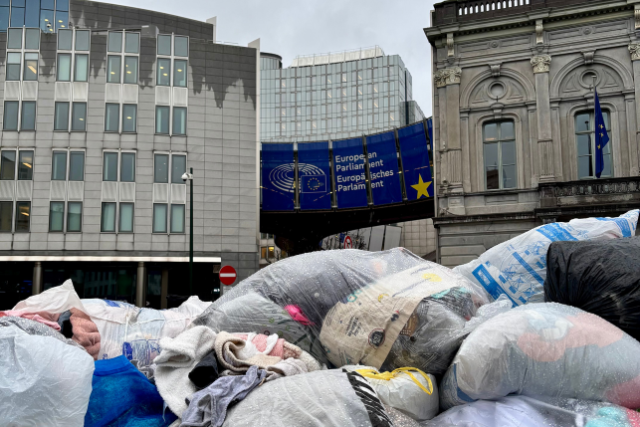European social and circular enterprises demand urgent EU action to address textile waste crisis
This Thursday morning, RREUSE, Ressources, Emmaüs Europe, and TESS GEIE staged a powerful demonstration in front of the European Parliament, calling attention to the severe crisis threatening the textile reuse and recycling sector. Without immediate EU intervention, the industry faces collapse.
A visual wake-up call
To highlight the issue’s urgency, demonstrators recreated a towering mountain of discarded textiles and a textile sorting line at Place du Luxembourg. The event brought together key stakeholders, including members of the RREUSE network, NGOs, and Members of the European Parliament from diverse political groups (the Greens, EPP, Renew). It provided a platform to discuss challenges in the sector and propose tangible solutions to support the social and circular economy. The action was followed by high-level meetings with key officials from the European Commission’s DG GROW, ENV, EMPL, and REGIO and discussions with the Cabinet of Executive Vice President Mînzatu.
The unfolding crisis
Textile collectors and sorting operators are struggling with an overwhelming influx of reusable items but lack viable options for processing them. Storage is not a sustainable solution, and recycling infrastructure remains inconsistent across the EU. The ever-increasing volume of textile waste – fueled by rapid collection renewals and billions of small online shipments – floods the market daily, pushing reuse and recycling systems to their breaking point.
“The influx of disposable fashion, and therefore low quality, non-reusable and non-recyclable garments, is overwhelming recovery systems,” explains Neva Nahtigal, Director of RREUSE. “We are extremely concerned about what this means for the future of social enterprises across the EU. Urgent action is needed to prevent the collapse of the entire sector, which provides tens of thousands of local,green and inclusive jobs“.
The decline in garment quality translates to lower reuse rates and higher volumes of textiles being incinerated, a trend worsened by rising energy costs and inflation. At the same time, the second-hand sector faces unfair competition from ultra-fast fashion producers, who exploit loopholes – such as customs exemptions on packages under €150 – to flood the market with cheaply made, unsustainable textiles. The crisis manifests in three key ways:
- Economic: Sorting centres shut down, leading to job losses and lost investment.
- Social: Thousands of jobs in social enterprises – many supporting vulnerable communities – are at risk.
- Environmental: Reusable and recyclable textiles are incinerated, causing serious environmental damage.
A call for immediate action
“Europe urgently needs to take measures to remedy the lack of responsibility of textile producers,“asserts Franck Kerckhof, spokesperson for the Ressources Federation. RREUSE and its partners call for an immediate action plan, including interim financing mechanisms to sustain the sector until Extended Producer Responsibility (EPR) systems are fully operational.
EU policymakers must utilise existing financial instruments – such as the Recovery and Resilience Fund, the Just Transition Facility (managed by CINEA), or loans from the European Investment Bank (EIB) – to provide urgent relief. Once EPR for textiles is in place, producer responsibility organisations should reimburse these funds at the national level. Where EPR schemes already exist, emergency funds should be released immediately, as partially seen in France.
Background and the path forward
RREUSE, the EU’s largest network of social enterprises in the circular economy, processes 337,000 tonnes of textiles annually and facilitates local reuse of 47,000 tonnes. These organisations have decades of expertise in collecting, sorting, and repurposing textiles while generating employment opportunities and fostering social inclusion. A single social enterprise creates between 20 and 35 jobs for individuals at risk of social exclusion per 1,000 tonnes of textiles collected.
“The EU cross-border market for used clothing and recycling is saturated,” stresses Alexandre Bohl, representing TESS GEIE, a grouping of key players in the social and circular textile economy from Belgium, France, Spain and Italy. However, the crisis is being worsened by a critical funding gap. While separate textile collection became mandatory in January 2025, no compulsory funding mechanism exists to cover costs. Current EPR discussions remain stalled, and even where textile EPR schemes exist(e.g., France and the Netherlands), they fail to address the sector’s challenges fully.
“Social economy actors are pioneers of the circular economy, reusing goods instead of destroying them. Today, we can’t afford to pay for the consequences of global overproduction. Producers and marketers must accept the consequences of their actions and economically support our actions,” emphasises Eve Poulteau, Emmaüs Europe’s Chief Executive.
The message is clear: The EU must act now to prevent the textile reuse and recycling sector fromcollapsing. The time for urgent, decisive intervention is now.


